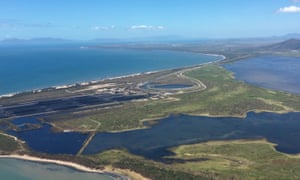Infrastructure Australia has not identified a proposed rail line
linking the controversial Adani coalmine with the Abbot Point port as a
priority, and it has not consulted the body which is expected to stump
up a concessional loan.
The chief executive of Infrastructure Australia, Philip Davies, told a Senate estimates hearing on Monday that the rail line – which has been pushed assiduously by the federal resources minister, Matt Canavan – was not “something we’ve currently identified” as a priority project.
Infrastructure Australia produces a priority list of nationally significant investments which is supposed guide government investment decisions.
Davies said he had not yet discussed the Adani project with the Northern Australia Infrastructure Facility (Naif), even though the rail project has completed a preliminary assessment and been referred for further consideration.
Adani is seeking a $900m concessional loan from the Naif for the rail line. Infrastructure Australia and the Naif are required to consult on projects worth more than $100m.
Officials from Infrastructure Australia told a Senate estimates
hearing on Monday they had had a discussion with the Naif on only one
project, which was below the $100m threshold, as an exercise in ensuring
both agencies understood one another’s procedures.
When pressed to reveal what the sub-$100m project was, officials said the precise details were confidential, but it was a telecommunications project in a remote region.
Asked by the Greens leader, Richard Di Natale, whether Monday’s answers at the Senate committee indicated that Infrastructure Australia did not see the Adani rail line as a priority, Davies replied: “Not at this stage.”
Davies said Infrastructure Australia had not received a submission on the rail line from the Queensland government, and had not conducted any cost-benefit analysis.
The progressive thinktank the Australia Institute recently lodged a freedom of information request in an effort to establish the Naif’s policies for assessing the public benefits of the projects it intended to fund.
A public benefit policy document released to the thinktank was so heavily redacted it was impossible to ascertain how the policy would be applied.
Tom Swann, a researcher at the Australia Institute, told Guardian Australia a “small body with sparse and secretive governance is facing enormous pressure to put huge public subsidies into a project that makes little environmental or economic sense”.
“Under FOI, the Naif has refused to reveal how they will be assessing the purported public benefits of any project,” he said. “It’s not clear there is any.”
Responding to Infrastructure Australia’s evidence on Monday, Swann said: “The Adani project might be a political priority for the prime minister and minister Canavan, but Infrastructure Australia does not think it is a priority for the country.”
The chief executive of Infrastructure Australia, Philip Davies, told a Senate estimates hearing on Monday that the rail line – which has been pushed assiduously by the federal resources minister, Matt Canavan – was not “something we’ve currently identified” as a priority project.
Infrastructure Australia produces a priority list of nationally significant investments which is supposed guide government investment decisions.
Davies said he had not yet discussed the Adani project with the Northern Australia Infrastructure Facility (Naif), even though the rail project has completed a preliminary assessment and been referred for further consideration.
Adani is seeking a $900m concessional loan from the Naif for the rail line. Infrastructure Australia and the Naif are required to consult on projects worth more than $100m.
When pressed to reveal what the sub-$100m project was, officials said the precise details were confidential, but it was a telecommunications project in a remote region.
Asked by the Greens leader, Richard Di Natale, whether Monday’s answers at the Senate committee indicated that Infrastructure Australia did not see the Adani rail line as a priority, Davies replied: “Not at this stage.”
Davies said Infrastructure Australia had not received a submission on the rail line from the Queensland government, and had not conducted any cost-benefit analysis.
The progressive thinktank the Australia Institute recently lodged a freedom of information request in an effort to establish the Naif’s policies for assessing the public benefits of the projects it intended to fund.
A public benefit policy document released to the thinktank was so heavily redacted it was impossible to ascertain how the policy would be applied.
Tom Swann, a researcher at the Australia Institute, told Guardian Australia a “small body with sparse and secretive governance is facing enormous pressure to put huge public subsidies into a project that makes little environmental or economic sense”.
“Under FOI, the Naif has refused to reveal how they will be assessing the purported public benefits of any project,” he said. “It’s not clear there is any.”
Responding to Infrastructure Australia’s evidence on Monday, Swann said: “The Adani project might be a political priority for the prime minister and minister Canavan, but Infrastructure Australia does not think it is a priority for the country.”

No comments:
Post a Comment